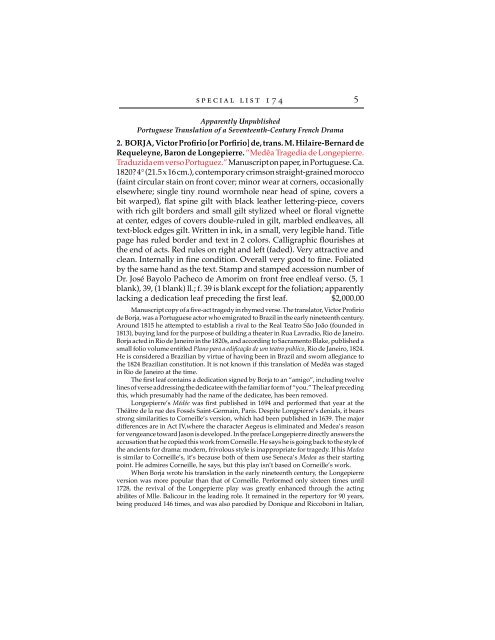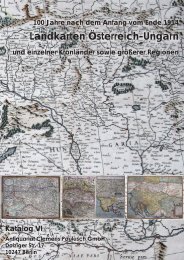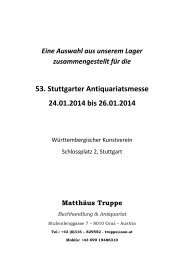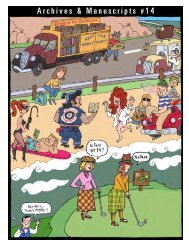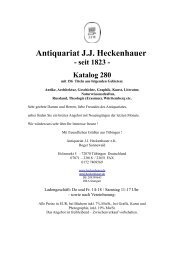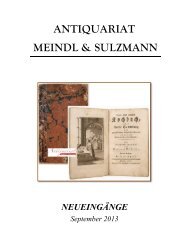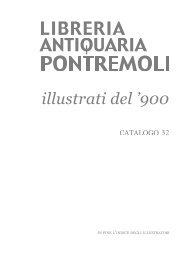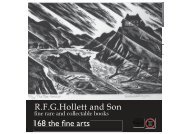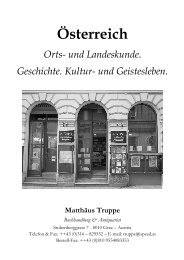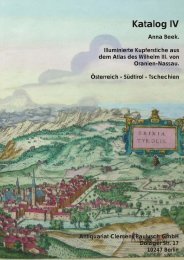Special List 174 - Richard C. Ramer Old & Rare Books
Special List 174 - Richard C. Ramer Old & Rare Books
Special List 174 - Richard C. Ramer Old & Rare Books
You also want an ePaper? Increase the reach of your titles
YUMPU automatically turns print PDFs into web optimized ePapers that Google loves.
special list <strong>174</strong> 5<br />
Apparently Unpublished<br />
Portuguese Translation of a Seventeenth-Century French Drama<br />
2. BORJA, Victor Profirio [or Porfirio] de, trans. M. Hilaire-Bernard de<br />
Requeleyne, Baron de Longepierre. ”Medêa Tragedia de Longepierre.<br />
Traduzida em verso Portuguez.” Manuscript on paper, in Portuguese. Ca.<br />
1820? 4° (21.5 x 16 cm.), contemporary crimson straight-grained morocco<br />
(faint circular stain on front cover; minor wear at corners, occasionally<br />
elsewhere; single tiny round wormhole near head of spine, covers a<br />
bit warped), flat spine gilt with black leather lettering-piece, covers<br />
with rich gilt borders and small gilt stylized wheel or floral vignette<br />
at center, edges of covers double-ruled in gilt, marbled endleaves, all<br />
text-block edges gilt. Written in ink, in a small, very legible hand. Title<br />
page has ruled border and text in 2 colors. Calligraphic flourishes at<br />
the end of acts. Red rules on right and left (faded). Very attractive and<br />
clean. Internally in fine condition. Overall very good to fine. Foliated<br />
by the same hand as the text. Stamp and stamped accession number of<br />
Dr. José Bayolo Pacheco de Amorim on front free endleaf verso. (5, 1<br />
blank), 39, (1 blank) ll.; f. 39 is blank except for the foliation; apparently<br />
lacking a dedication leaf preceding the first leaf. $2,000.00<br />
Manuscript copy of a five-act tragedy in rhymed verse. The translator, Victor Profirio<br />
de Borja, was a Portuguese actor who emigrated to Brazil in the early nineteenth century.<br />
Around 1815 he attempted to establish a rival to the Real Teatro São João (founded in<br />
1813), buying land for the purpose of building a theater in Rua Lavradio, Rio de Janeiro.<br />
Borja acted in Rio de Janeiro in the 1820s, and according to Sacramento Blake, published a<br />
small folio volume entitled Plano para a edificação de um teatro publico, Rio de Janeiro, 1824.<br />
He is considered a Brazilian by virtue of having been in Brazil and sworn allegiance to<br />
the 1824 Brazilian constitution. It is not known if this translation of Medêa was staged<br />
in Rio de Janeiro at the time.<br />
The first leaf contains a dedication signed by Borja to an “amigo”, including twelve<br />
lines of verse addressing the dedicatee with the familiar form of “you.” The leaf preceding<br />
this, which presumably had the name of the dedicatee, has been removed.<br />
Longepierre’s Médée was first published in 1694 and performed that year at the<br />
Théâtre de la rue des Fossés Saint-Germain, Paris. Despite Longpierre’s denials, it bears<br />
strong similarities to Corneille’s version, which had been published in 1639. The major<br />
differences are in Act IV,where the character Aegeus is eliminated and Medea’s reason<br />
for vengeance toward Jason is developed. In the preface Longepierre directly answers the<br />
accusation that he copied this work from Corneille. He says he is going back to the style of<br />
the ancients for drama: modern, frivolous style is inappropriate for tragedy. If his Medea<br />
is similar to Corneille’s, it’s because both of them use Seneca’s Medea as their starting<br />
point. He admires Corneille, he says, but this play isn’t based on Corneille’s work.<br />
When Borja wrote his translation in the early nineteenth century, the Longepierre<br />
version was more popular than that of Corneille. Performed only sixteen times until<br />
1728, the revival of the Longepierre play was greatly enhanced through the acting<br />
abilites of Mlle. Balicour in the leading role. It remained in the repertory for 90 years,<br />
being produced 146 times, and was also parodied by Donique and Riccoboni in Italian,


